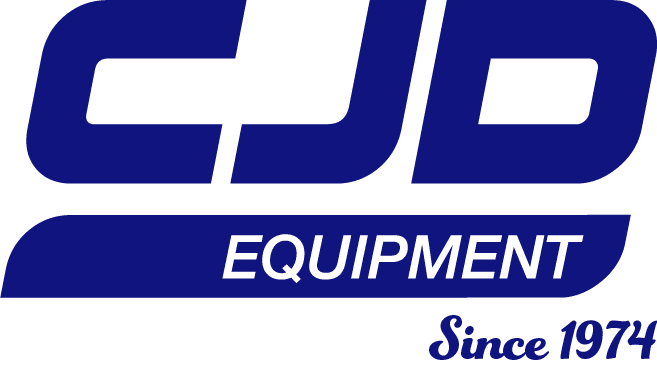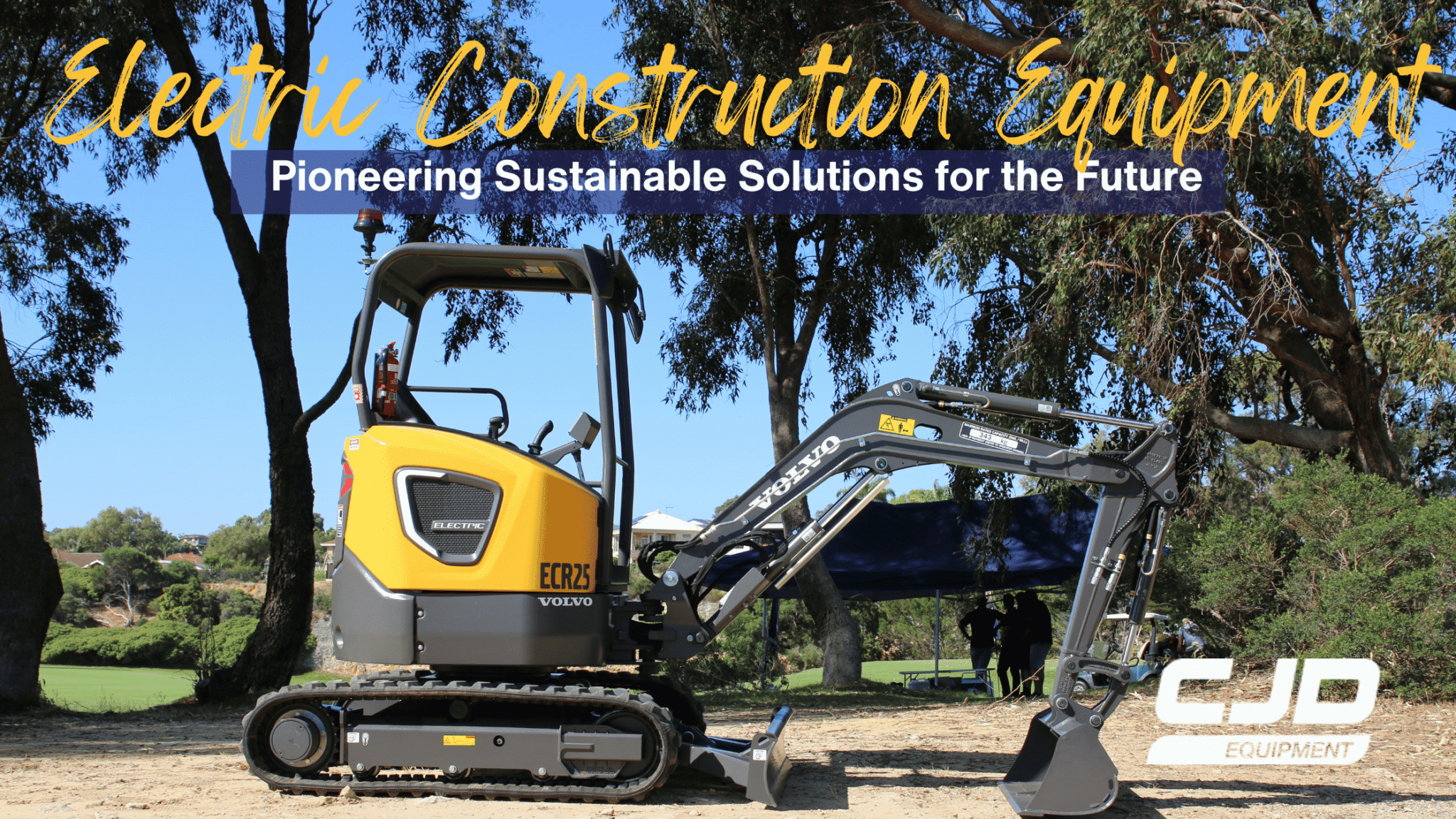The construction industry is experiencing a significant shift towards sustainability as more and more companies recognise the importance of reducing their carbon footprint. In line with this trend, heavy machinery manufacturers are introducing all-electric versions of traditional construction vehicles. Electric construction equipment quickly emerges as an eco-friendly alternative to diesel-powered machinery, offering numerous benefits for construction companies and the environment.
This comprehensive guide will explore the world of electric construction equipment, its benefits, the types of machines available, and its potential to revolutionise the construction industry.
All-Electric vs. Diesel: A New Era of Construction Machinery
Regarding heavy machinery, diesel-powered equipment has long been the industry standard. However, the rise of electric construction equipment is challenging this status quo. All-electric machines are gaining traction in the construction industry, offering comparable performance capabilities to their diesel counterparts. Leading manufacturers such as Volvo CE have reported that their electric excavators and wheel loaders have specifications like diesel models.
The critical difference between all-electric and diesel equipment lies under the hood. Instead of relying on a diesel engine and cooling fan, electric equipment is powered by rechargeable lithium-ion battery packs.

Hybrid Construction Equipment Technology: The Best of Both Worlds
For instance, the Volvo EC300E Hybrid features unique hydraulic hybrid technology. This excavator utilises the boom-down motion to charge accumulators, and the stored energy is used to drive the assist motor, lowering the torque requirement on the engine.
The result is up to 15% lower fuel consumption. The EC300E Hybrid is part of Volvo’s commitment to bring innovative products to the market, particularly those that promote environmental sustainability. Hybrid electric equipment represents a transitional solution for construction companies looking to reduce emissions without sacrificing power and performance.
The Top Three Benefits of Electric Construction Equipment

Electric construction equipment offers a range of advantages over its diesel-powered counterparts. Let’s take a closer look at the top three benefits that make electric machinery an appealing choice for construction companies:
- Lower Carbon Emissions: Promoting Sustainable Construction Practices
One of the most significant advantages of electric construction equipment is its ability to deliver net-zero carbon emissions. Unlike diesel-powered machinery, electric equipment does not rely on gasoline or diesel fuel, making it an environmentally friendly choice. This is particularly crucial as the construction industry currently accounts for approximately 39% of the world’s CO2 emissions related to energy.
By utilising lithium-ion batteries, electric machinery eliminates the need for fossil fuels. This is especially beneficial for companies operating in emission-restricted areas that prohibit using diesel-powered machines. Embracing electric construction equipment is crucial to sustainable construction practices and a greener future.
- Reduced Noise Pollution: A Quieter and Safer Work Environment
Noise pollution is widespread in the construction industry, affecting workers and nearby communities. Electric construction equipment addresses this problem by significantly reducing noise levels compared to traditional diesel-fueled machines. Electric machines lack a diesel engine and cooling fan, resulting in less noise and fewer vibrations during operation.
The reduction in noise levels not only creates a more pleasant work environment but also contributes to improved safety. Prolonged exposure to high noise levels can be hazardous, particularly for construction workers. Electric machinery offers a quieter alternative, minimising the risk of hearing damage and fatigue caused by excessive noise exposure. With electric equipment, construction workers can enjoy a safer and more comfortable work environment.
- Lower Project Costs: Saving Money in the Long Run
Electric construction equipment offers long-term cost savings for construction companies. Electric equipment reduces fuel costs and overall operating expenses by eliminating fuel needs. Unlike diesel-powered equipment, electric machinery does not accumulate idle engine run time. When the operator stops the machine, electric equipment turns off, preventing additional operating time from accumulating.
Additionally, electric construction equipment requires less maintenance compared to diesel models. Lithium-ion batteries and electric motors are virtually maintenance-free, reducing maintenance time and costs. With fewer parts and simplified systems, electric machinery streamlines maintenance processes and minimises the need for costly repairs. Companies can optimise project costs and achieve long-term savings by investing in electric construction equipment.
Types of Volvo Electric Construction Equipment: From Excavators to Loaders.Types of Volvo Electric Construction Equipment: From Excavators to Loaders.
As the demand for electric construction equipment grows, manufacturers are introducing new models across various machine categories. Let’s explore some of the electric machines currently available in the market:
Excavators: Pioneering Electric Solutions for Heavy Digging
Electric excavators were among the first all-electric machines to debut in the construction industry. Volvo CE, a leading manufacturer, unveiled its EX02 compact electric excavator prototype in 2017. Although the EX02 model never became commercially available, Volvo CE introduced the ECR18 and ECR25 Electric excavators. These models are currently available for pre-booking in Australia, with the first deliveries expected in Quarter 1 of 2024.
Wheel Loaders: Efficiency and Power in a Compact Package
Wheel loaders are a staple on construction sites, and manufacturers have swiftly developed all-electric models to meet the demand for sustainable solutions. Volvo CE’s L25 Electric compact wheel loader is a prime example of a successful electric wheel loader.
The Volvo L25 Electric is a compact wheel loader that delivers the performance expected from a machine of its size class but with the added benefits of less noise and zero emissions. It is powered by lithium-ion batteries, providing enough energy for an eight-hour working shift with a single charge. The machine incorporates two dedicated electric motors, one for the drivetrain and one for the working hydraulics, resulting in higher efficiency across the entire machine.
This electric wheel loader offers outstanding lifting and breakout forces, maximum traction, and unrivalled off-road capability and stability. Additionally, it features an onboard charger that allows for a full charge in approximately six hours and can reach a maximum speed of 20 km/h. The L25 Electric is a unique product, boasting greater comfort, productivity, and uptime, making it an ideal choice for various applications, including light infrastructure work, gardening, landscaping, and agriculture.
Dump Trucks and Mining Trucks: Electrifying the Mining Industry
Volvo Construction Equipment (Volvo CE) has been making significant strides in electrifying its machines and reducing its carbon footprint. In Q2 2023, the company reported a 12% global increase in sales of machines and services, with solid profitability.
Volvo CE has been developing electric solutions to maintain high productivity with zero emissions as part of its electromobility journey. In line with its commitment to reducing its carbon footprint, Volvo CE delivered North America’s first machine made using fossil-free steel in 2023, recognising the importance of reducing its carbon footprint across its entire value chain. The company has also been working on electrifying its vehicles, especially for mining equipment. It has deployed several new electric mining vehicle prototypes to reduce carbon emissions in the mining industry.
Additionally, Volvo Group, the parent company of Volvo CE, has been collaborating with steel companies like SSAB to create the world’s first fossil-free vehicles, emphasising the importance of fossil-free steel in reducing the climate impact of its products.
These initiatives demonstrate Volvo CE’s commitment to electrifying the mining industry and reducing its environmental impact, in line with the broader efforts of the Volvo Group to decarbonise transport and reduce the climate impact of its vehicles and machines. We hope to see these machines in Australia in the future.
Loaders and Tool Carriers: Small but Mighty Electric Machines

Forklifts are crucial in material handling operations, and manufacturers have recognised the potential for electric alternatives.
The benefits of adding forks to Volvo CE Electric compact L25 include increased precision, control, and productivity and the ability to handle various loads in confined spaces. The fork attachments are designed to provide clear visibility, allowing the operator a clear view of the ends of the tines, increasing precision and control.
The forks are ideal for pallet and material handling, and the heavy-duty design provides the strength to handle all the machine’s loads. Additionally, the fork attachments offer easy and fast change of tine spacing for increased flexibility, and the hydraulic adjustment functionality saves time and reduces the risk associated with manual fork adjustment.
Furthermore, the cranked tines design provides excellent visibility, and the hydraulic fork tines positioner allows the tines to shift side-to-side, making it especially useful when working in confined spaces.
For example, the L25 electric compact wheel loader can be equipped with forks, enabling it to work as a forklift inside spaces where emissions can be a problem, thanks to its zero exhaust emissions and significantly lower noise levels.
These benefits make the addition of forks to Volvo CE compact machines a valuable feature for various material handling applications, especially in indoor settings where emissions and noise are a concern.
What is the cost difference between electric and diesel construction equipment?
The cost difference between electric and diesel construction equipment varies based on several factors. While the upfront cost of purchasing electric equipment may be higher, electric construction equipment generally has lower operating costs than diesel equipment in the long run.
The cost of electricity is often lower than diesel fuel, and electric equipment typically requires less maintenance due to the absence of complex engine systems, resulting in reduced maintenance and repair expenses over time.
Is the power and performance of electric construction equipment limited?
According to an interview with Construction Dive, electric-powered machinery is competitive with the best diesel-operated equipment, offering environmental benefits by reducing emissions and lowering long-term costs through decreased energy and maintenance expenses.
Contractors adopt electric equipment to fight rising prices | Construction Dive
Additionally, the product manager for electromobility at Volvo CE stated that the power and performance of their electric ECR25 compact excavator and L25 compact wheel loader are nearly identical to their diesel counterparts, with the electric models offering even more advantages than diesel machines.
Electric Construction Equipment vs Diesel Performance | Volvo CE – The Scoop (volvoceblog.com)
The Future of Electric Construction Equipment: Embracing Sustainability
Electric construction equipment is being introduced into the Australian market. However, with increasing environmental concerns and regulatory pressures, the construction industry will likely witness a rapid shift towards electric machinery in the coming decades.
The Australian construction industry is witnessing a growing emphasis on sustainability, with an increasing focus on adopting electric construction equipment. While environmental regulations and requirements are more prevalent in Europe, they are gaining traction in Australia, prompting significant businesses, mining companies, and local governments to embrace sustainable objectives.
Volvo CE and CJD Equipment push for sustainable construction (earthmovers-magazine.com.au)
However, the absence of clear federal regulations on emission standards and incentives to promote the uptake of electric construction equipment in Australia means that the transformation must come from the industry itself.
Despite this, the Australian construction industry is making strides towards sustainability by leveraging advanced technologies, new building materials, and a commitment to embracing electric compact equipment, such as skid steers, compact excavators, and compact loaders, which is gaining momentum in the country.
The industry’s focus on sustainability is further underscored by the heightened enforcement activity and proposed regulatory regimes focused on ESG matters in Australia, influencing the corporate agenda and driving the need for organisations to consider their ESG risks and opportunities proactively.
Conclusion: Types of Volvo Electric Construction Equipment: From Excavators to Loaders.

Electric construction equipment represents a significant leap forward in the quest for sustainable construction practices. With its lower carbon emissions, reduced noise pollution, and long-term cost savings, electric machinery offers undeniable advantages for construction companies. The availability of electric excavators, wheel loaders, dump trucks, mining trucks, and forklifts demonstrates the industry’s commitment to embracing greener technologies.
As construction companies increasingly recognise the importance of sustainability and environmental responsibility, the demand for electric construction equipment will continue to rise. The transition to electric machinery is an investment in a greener future and a strategic move that enhances project efficiency and competitiveness.
By choosing electric construction equipment, construction companies can drive positive change in the industry, reduce their environmental impact, and create a safer and more sustainable work environment. The future of heavy machinery is electric, and embracing this shift is the key to brighter, greener, and more prosperous construction industry.
Additional Information: Why Choose Electric Construction Equipment in Australia
Electric construction equipment is gaining significant traction in Australia due to the country’s commitment to sustainability and its renewable energy goals. Australia, known for its vast renewable energy resources, is well-positioned to embrace electric machinery in the construction industry.
By choosing electric construction equipment in Australia, construction companies can align their operations with the country’s ambitious renewable energy targets. Adopting electric machinery reduces Australia’s carbon footprint and supports the transition to a low-carbon economy.
Furthermore, electric construction equipment in Australia is environmentally friendly and offers economic benefits. With the country’s abundant renewable energy sources, the cost of electricity for charging electric machinery is relatively low compared to fossil fuel prices. This translates to long-term cost savings for construction companies, making electric machinery a financially viable choice.
There is also a growing trend in big businesses aligning with the science-based Target initiatives in line with the Paris Agreement. Big players in sectors such as Mining and Agriculture are adopting progressive carbon reduction targets, relying on them and their contractors to transition towards net zero.
CJD Equipment in Australia offers a compelling choice for electric construction equipment, backed by its renowned service and parts support. The company is known for its comprehensive range of truck parts and earthmoving equipment parts, with over 250,000 parts available in its inventory.
CJD Equipment’s commitment to providing customers with the highest levels of service and support is evident through its national supply network, 24/7 after-hours call-out service, and highly skilled personnel.
Our company’s focus on efficiency is further highlighted by its 24/7 after-hours call-out service, enabling quick part location and direct dispatch to the customer’s site.
As the market for electric compact construction equipment is projected to grow rapidly, CJD Equipment’s offering of electric machines aligns with this trend, providing customers access to state-of-the-art electric equipment.
This article first appeared on CJD Equipment’s LinkedIn Page.




